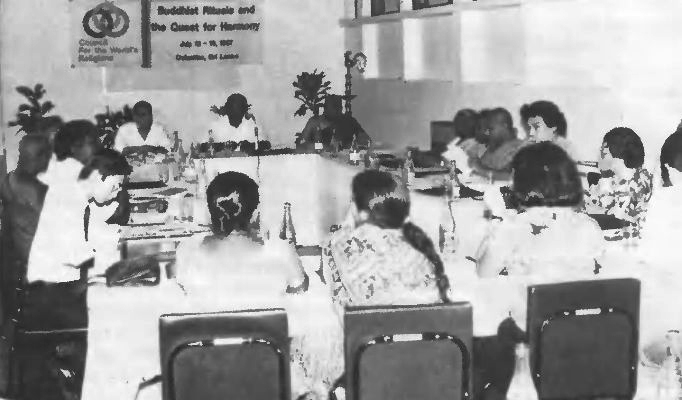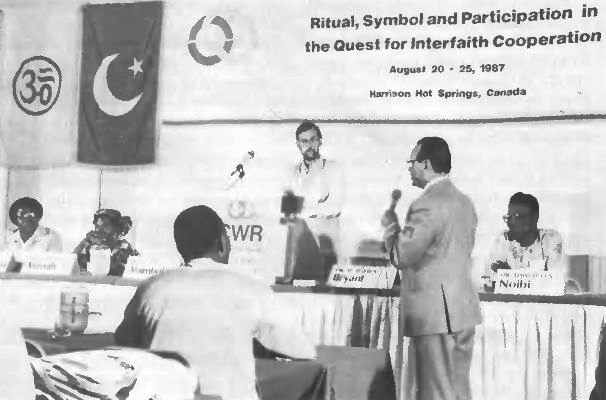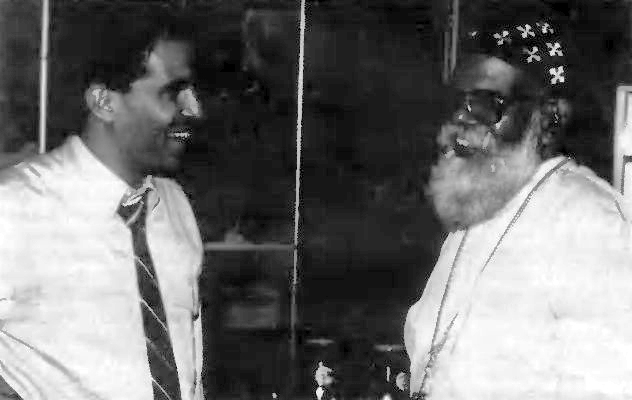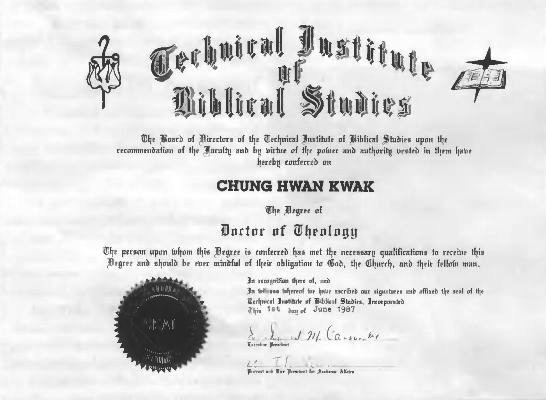![]()
The Words of the Watson Family
|
|
The Words of the Watson Family |

Discussion
group meeting at the intra-Buddhist conference.
In 1987, a total of 200 distinguished leaders and scholars from 40 countries attended six inter- and intra-religious conferences sponsored by the Council for the World's Religions (CWR). The high quality and increased number of participants compared to last year's conferences reflect the continued growth and development of CWR. The Council, a project of the International Religious Foundation (IRF), was created by Father in 1984 to foster harmony and mutual respect among the religions and religious leaders of the world through dialogue. It seeks to dissolve the bitter legacy of strife, hatred, and rivalry that has plagued the religious world and prevented believers from realizing the noble ideals of their own scriptures and traditions.
Five of these conferences were devoted to intra-religious reconciliation. All of the major religious traditions in the world have splintered into denominations and sects, and differences in doctrine and practice among these groups sometimes leads to conflict as severe and tragic as that which has often erupted between different religions. At these five conferences, scholars and religious leaders gathered to discuss the causes of, and practical solutions to, divisions within their own communities of faith. Each participant was asked to write a paper on the topic of the conference, which provided a basis for discussion. An address by Rev. Chung Hwan Kwak was delivered at each conference (two of which he delivered in person), explaining Father's vision for CWR and for the world's religious believers.

A
question-and-answer session at the second annual CWR interfaith
conference.
The conference themes grew out of discussions among CWR Executive Director Frank Kaufmann and Senior Consultants Dr. H. Francis Clark and Dr. M. Darrol Bryant. Also essential to determining the shape and focus of each conference were the convener and a representative chosen from the CWR board of consultants, both of whom were in each case committed and practicing believers of that particular religion. Participants were able to speak their minds in an atmosphere of complete freedom. CWR Assistant Director Jeff Gledhill said of these conferences: "It never fails to-be a rich experience for all who participate. No matter how much [the participants] differ intellectually, they come away with a heartistic sense of the unity that exists in their tradition!'
The intra-Buddhist dialogue, the third that CWR has sponsored, was held from July 12-16 in Colombo, Sri Lanka, and was attended by 19 Buddhist leaders and scholars from 10 nations. The theme of the conference was "Buddhist Rituals and the Quest for Harmony!' Buddhism has adopted a variety of rituals throughout its 2,500 year history, and these differ in meaning for the practitioners of the various Buddhist traditions. The discussion of papers detailing the meaning and purpose of these rituals helped everyone grasp a fundamental sense of the unity within Buddhism, despite its variety of practices. It was a time of learning, even for the eldest participants. Demonstrations and anecdotes enriched the conference as the scholars shared their own rituals and learned from others'. Those present were excited to discover the breadth of diversity within their own religion.
"Christian Ministry in Ecumenical Perspective,' held in Eibsee, West Germany, from July 20-24, was attended by 30 Christian leaders from 15 nations. The convener, Dr. H. Francis Clark, was able to bring some of the most prominent leaders of Christian ecumenism together at this beautiful Alpine location. Participants were asked to write on the theology of ministry as a theme through which ecumenical issues could be brought out. The discussion among representatives of the main Christian traditions -- Protestant, Orthodox, and Roman Catholic -- made clear that the greatest barriers to Christian harmony were not questions of the trinity or the person of Christ but the issues of the sacraments, church authority, and role of the ministry. The conference theme allowed for the emergence of a broad range of impassioned concerns. Plenary addresses, rather than being dry academic discourses, were virtual calls to action. The discussions covered important new ground in ecumenical thought, enriching and inspiring everyone.
In Nairobi, Kenya, 17 scholars, leaders, and practitioners of traditional African religions from 10 nations met from September 10-14 to discuss "The Place of African Traditional Religions in Contemporary Africa" In the current emphasis on the economic and political aspects of African society, the humane and vital spiritual dimensions of traditional beliefs are often overlooked. The papers prepared by the participants, and the ensuing discussions, recognized the necessity for both unity and tolerance among all the divergent sects in the face of this challenge. This conference was rich and colorful in many ways. Everyone present acknowledged CWR as the first interfaith organization to recognize legitimate spirituality in the traditional African religions.

CWR
Executive Director Frank Kaufmann shares a moment with Archbishop
Paulos Mar Gregorios, a president of the World Council of Churches.
Jewish scholars met at Kiamesha Lake, New York, from September 1722, to discuss "The Varieties of Jewish Approaches to Redemption." This conference, CWR's third intra-Jewish dialogue, is part of an ongoing effort to examine the contemporary situation of worldwide Judaism. Redemption, as a central concern of Jewish theology and community, was examined from a wide variety of viewpoints -- ranging from traditional forms of Messianism, Zionism, and socialism to even such disciplines as psychotherapy and the healing arts. By comparing and discussing this great variety of approaches, participants gained a greater appreciation for the vibrant and dynamic breadth of contemporary Judaism.
The intra-Muslim conference, held in Casablanca, Morocco, from November 7-11, brought together Muslims from 10 different nations to examine "Unity in Diversity and Diversity in Unity in the Muslim World" Papers for the conference examined the fundamental sources of Islamic unity and the historical roots of diversity, as well as issues facing the Islamic community today and in the future. Participants in the wide-ranging discussion felt the conference was a valuable step in strengthening the harmony of the House of Islam.
Each of these five conferences had a unique flavor of its own. As everyone shared in the daily religious practices, the conferences came to truly express the life and culture of each particular religion. Even the language and style of the dialogues reflected that particular tradition and enhanced the atmosphere. The CWR is committed to helping God, or the Absolute, and the inherited tradition to actually be present for the participants. In this way a foundation for the development of internal unity can be laid.
In 1987 the CWR also held its second annual conference on the worldwide interfaith movement. This gathering provided an utterly different religious encounter than did the intra-religious events. From August 20-25, in Harrison Hot Springs, British Colombia, Canada, 98 religious leaders and scholars from 17 nations representing the major religions gathered to discuss "Ritual, Symbol and Participation in the Quest for Interfaith Cooperation." Rather than discussing doctrines, the scholars explored the ritualistic and symbolic dimensions of their own traditions and investigated the possibility of taking part in ritual across traditions.
A major feature of this conference was the meditation and prayer sessions held each morning, which provided an opportunity for the religious leaders to explore the faith of others as well as share their own. The purpose was to confront the deeper division between religions and create the opportunity for shared experience, increasing mutual understanding and respect.

In
June 1987, Rev. Chung Hwan Kwak received a degree of Doctor of
Theology from the Technical Institute of Biblical Studies in Orlando,
Florida. It was an earned degree, based on many of his written
materials.
Even as the busy 1987 season of conferences ended, work on the 1988 conferences was already beginning. A conference on inter-religious relations in the Middle East is scheduled for March in Spain. A major intra-Christian conference for 50-60 participants will be held in Jerusalem in May on the theme "Christians and the Wider Ecumenism: Hindus and Sikhs will come together in India in July to discuss theological and social issues in their respective faiths. Switzerland is the site for the 1988 intra-Jewish dialogue in September. The third annual interfaith conference is slated for October in Korea.
In addition to sponsoring these conferences, CWR is playing a major role in planning the second Assembly of the World's Religions, to be held in October 1989 in Korea. The first, held in McAfee, New Jersey in November 1985, brought together more than 800 men and women of different faiths for dialogue and fellowship. The third Assembly will be held in 1993, coinciding with the centenary of the 1893 World Parliament of Religions. Assemblies will be held every four years thereafter. The planning of these great gatherings will be a steady and ongoing concern of CWR, as it strives to fulfill Father's hopes for the religions and religious believers of the world.
Religious dialogue and harmony is a clear necessity in our age. As Father said in his Founder's Address at the Assembly of the World's Religions in November 1985:
God is not sectarian. He is not obsessed with minor details of doctrine. We should quickly liberate ourselves from theological conflict which results from blind attachment to doctrines and rituals, and instead focus on living communication with God.
...Today God is trying to embrace the whole of mankind as His children. Through inter-religious dialogue and harmony we should realize one ideal world of peace, which is God's purpose of creation and the common ideal of humankind.